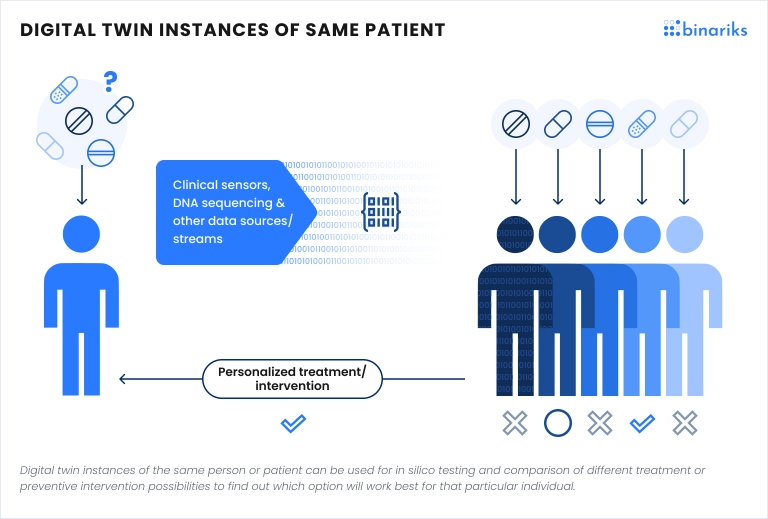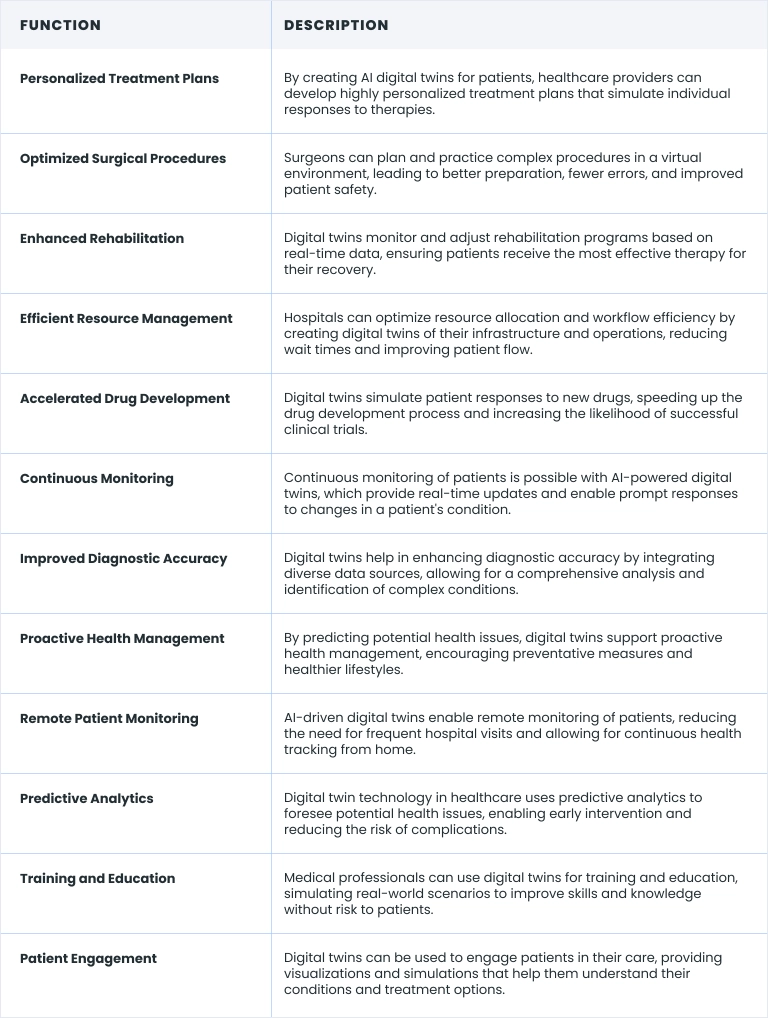AI-based digital twins in healthcare are now definitely among healthcare technology trends , making waves by offering personalized, predictive, and preventive care. These virtual replicas of physical entities allow healthcare providers to simulate and optimize processes, leading to better patient outcomes and more efficient medical research.
By creating digital twins in healthcare, medics can conduct detailed analyses and simulations, transforming how we approach patient care and medical treatments. In this article, you'll discover what AI-driven digital twinning is, as well as its applications, benefits, and implementation challenges.
Read on to uncover how digital twins are shaping the future of healthcare.
Transform your business with generative AI
Unlock AI insights and strategies with our comprehensive whitepaper
Meet the challenges of tomorrow with confidence

What is AI-driven digital twinning?
AI-driven digital twinning involves creating virtual models of physical objects or systems using artificial intelligence. These digital twins in healthcare mimic the behavior and characteristics of their real-world counterparts, allowing for detailed analysis, simulations, and predictions.
The main components of an AI-driven digital twin system include:
- Machine Learning (ML): Machine learning algorithms enable digital twins to learn from vast healthcare data. By analyzing patterns and trends, ML improves the accuracy and predictive capabilities of digital twins, helping to forecast disease progression, patient responses to treatments, and potential complications.
- Natural Language Processing (NLP): NLP allows digital twins to process and understand unstructured medical data such as doctor's notes, patient histories, and clinical reports. This capability ensures that all relevant information is incorporated into the digital twin, providing a comprehensive view of the patient's health.
- Deep Learning: Deep learning techniques are used to model complex physiological processes and disease mechanisms. These advanced algorithms enhance the digital twin's ability to make precise predictions about patient outcomes, support early diagnosis, and tailor personalized treatment plans.
In the context of digital twin AI medicine, these components work together to create highly accurate and dynamic patient models. AI-driven digital twins provide a holistic view of a patient's health by integrating data from various sources, including electronic health records, wearable devices, and genetic information.
AI digital twin healthcare solutions allow healthcare providers to simulate different treatment scenarios, optimize care plans, and anticipate potential health issues before they become critical. For example, a digital twin of a patient with a chronic condition can be used to test the efficacy of different medications and lifestyle changes, helping doctors make informed decisions that improve patient outcomes.
Applications of AI-based digital twins in healthcare
Let's dive deeper into how this technology is being applied:
Patient-centric applications
According to Researchgate, AI-driven digital twinning helps simulate individual responses to treatments, predict disease progression, and optimize personalized care plans. By incorporating real-time data from wearable devices and electronic health records, healthcare providers can continuously monitor and adjust treatments to achieve the best possible outcomes (Source ).

Operational efficiency
AI in healthcare digital twins helps hospitals and clinics improve operational efficiency. Administrators can simulate different scenarios to optimize resource allocation, reduce wait times, and improve patient flow by creating digital twins of hospital infrastructure and workflows. This leads to more efficient medical staff, equipment, and facilities use.
Drug development
In the realm of drug development, AI medical digital twin technology accelerates the process of bringing new medications to market. Digital twins of patients are used to simulate drug interactions and predict outcomes in virtual clinical trials. This reduces the time and cost associated with traditional clinical trials and increases the likelihood of successful outcomes.
Surgical planning
As the PubMed Central mentions, digital twins can be also used for surgical planning and training. Surgeons can practice complex procedures on digital replicas of patients, allowing them to anticipate potential complications and refine their techniques. This leads to improved surgical outcomes and reduced risks for patients (Source ).
Spatial planning
According to research published in the International Journal of Computer Assisted Radiology and Surgery, spatial planning using digital twins involves creating virtual replicas of operating rooms to optimize space utilization and procedural workflows.
Digital twins can be generated from casual video captures using advanced techniques like neural rendering, enabling immersive and detailed spatial planning in virtual reality. This approach helps identify and address potential obstacles, improve efficiency, and enhance the overall effectiveness of medical procedures and operations (Source ).
These applications demonstrate the transformative potential of digital twin technology in healthcare. By leveraging these innovations, medical professionals can deliver more precise, efficient, and personalized care, ultimately improving operational efficiency and patient outcomes.
Benefits of using AI-powered digital twins in the medical field
Let's sum up all the benefits of AI-powered digital twins for healthcare in this table:

Implementation challenges
While the application of AI digital twins in medicine holds great promise, several challenges must be addressed to realize their full potential. These challenges span technical, ethical, and operational aspects.
Data integration and quality
One of the primary challenges in implementing AI digital twin healthcare solutions is integrating and maintaining high-quality data. Digital twins rely on vast amounts of accurate and real-time data from various sources, including electronic health records, wearable devices, and genetic information.
Ensuring the compatibility and reliability of this data is crucial. Poor data quality or integration issues can lead to inaccurate simulations and predictions, undermining the effectiveness of digital twins.
Privacy and security concerns
The use of digital twins in healthcare raises significant privacy and security concerns. Given that patient data is highly sensitive, the creation of digital twins involves extensive data collection and analysis.
Therefore, it is essential to protect this data from breaches and ensure compliance with privacy regulations. This can be achieved by implementing robust cybersecurity measures and ensuring that patient consent and data usage policies are clear and strictly followed.
Technical and operational barriers
Deploying AI-driven digital twins in healthcare settings is a significant challenge that requires substantial technical infrastructure and expertise. Many healthcare facilities may lack the necessary resources or skilled personnel to develop, implement, and maintain these advanced systems.
Additionally, integrating digital twin technology with existing medical workflows and systems can be complex and time-consuming.
How do you tackle all these challenges? Of course, choosing the right tech partner is the first step.
Binariks specializes in custom healthcare software development and maintenance. With expertise in data integration, interoperability (of systems, software, and networks), and deep domain knowledge, we can help your company overcome the challenges of adopting the latest technologies tailored to solve your specific problems.
By partnering with Binariks, healthcare providers can leverage cutting-edge tools and expert support, enhancing patient care and operational efficiency and maintaining the sharpest competitive edge.
Take your software to new heights with tailored AI/ML solutions
Final thoughts
AI-powered digital twins are a game-changer for healthcare, enabling personalized and efficient patient care through detailed simulations and predictive analytics.
While challenges like data integration, privacy concerns, and technical complexities exist, the benefits of this technology outweigh the difficulties. As we move forward, digital twins will be instrumental in creating a more responsive and effective healthcare system, heralding a new era of medical innovation and advancement.
Share

